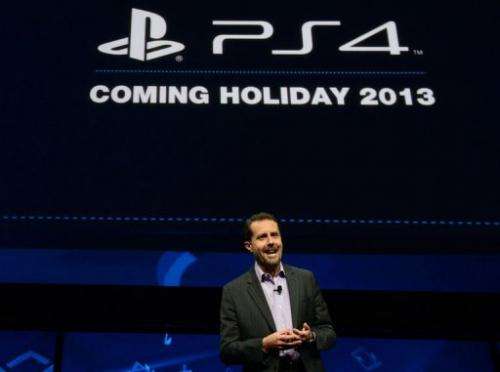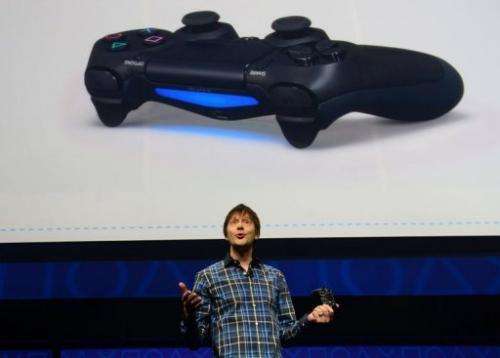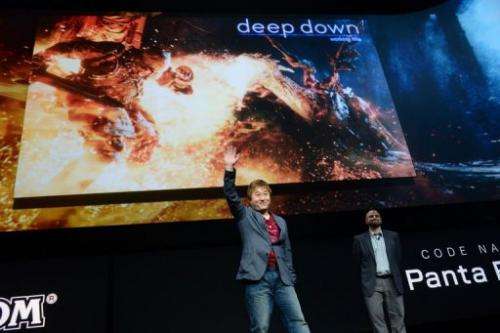Sony's Andrew House, current president and Group CEO of Sony Computer Entertainment, introduces the PlayStation 4 at a news conference February 20, 2013 in New York. Sony shares fell on Thursday after the Japanese electronics giant announced its next-generation PlayStation 4 in New York, but without unveiling the console or saying how much it would cost.
Sony shares fell on Thursday after the Japanese electronics giant announced its next-generation PlayStation 4 in New York, but without unveiling the console or saying how much it would cost.
The firm said it would launch the new console for the holiday season, touting it as a "significant shift from thinking of PlayStation as a box or console to thinking of the PlayStation 4 as a leading place for play".
However, there was no mention of what plans the company had regarding films, music, television shows and other digital content offered on the PS4.
And investors seemed initially unimpressed, with Sony ending down 1.77 percent at 1,331 yen on Tokyo's Nikkei index, while ratings agency Fitch warned the new gadget was unlikely to turn the firm's fortunes around.
"It was odd that Sony did not show a physical device" at the New York event, said Gartner consumer technologies research director Brian Blau, adding that the firm was likely trying to generate buzz about the console.
Sony, Nintendo and Xbox maker Microsoft dominate the global games console market, which is worth about $44 billion annually, according to industry figures.
Video game designer Mark Cerny talks about the new controler Bioshock 4 as Sony introduces the PlayStation 4 at a news conference on February 20, 2013 in New York.
But they have come under increasing pressure in the face of tough competition from cheap—or sometimes free—downloadable games for smartphones and tablets.
"Investors might want to wait and see the reaction from consumers to the PS4 before actively buying Sony shares, as its PS3 was not really successful," said Toshiyuki Kanayama, senior market analyst at Monex Inc.
Japanese video game producer for Capcom Yoshinori Ono talks as Sony introduces the PlayStation 4 at a news conference February 20, 2013 in New York.
The PlayStation 3 sold more than 75 million units, about half of the 155 million units of the PlayStation 2 that have been sold since its debut in 2000 and which made it one of the best-selling videogame consoles of all time.
The PS4 is a key part of Sony's bid to return to profitability after four years in the red. But Fitch Ratings warned that it was "unlikely to be Sony's saviour" noting that it lost money on the PS3 for the first several years after its launch until production costs fell.
"The competitive nature of the market may also constrain profitability," the agency said in a note Thursday.
"The key to the product's success will be price, timing, content and how it compares with the yet-to-be-announced next generation Xbox. None of these details are currently available."
Games consoles are typically priced in the $400 to $500 range, and blockbuster game titles hit the market at $60 each.
In November, Fitch downgraded Sony to junk status for the first time, citing its dire financial situation and shrinking footprint in the global electronics sector. Struggling domestic rivals Panasonic and Sharp have also been sideswiped by junk downgrades.
On Wednesday in Tokyo, Sony said it would book a one-time gain of 115 billion yen ($1.2 billion) by selling a six percent stake in M3 Inc.—which supplies online medical information to doctors—to Deutsche Securities.
The move represents Sony's latest asset sale as it eyes a full-year profit, while undergoing a massive corporate overhaul that includes thousands of job cuts and the sale of a chemical division and its US headquarters in Manhattan.
Japan's electronics sector has suffered from myriad problems including a strong yen, slowing demand in key export markets, fierce overseas competition, especially in television sales, and strategic mistakes.
(c) 2013 AFP


























